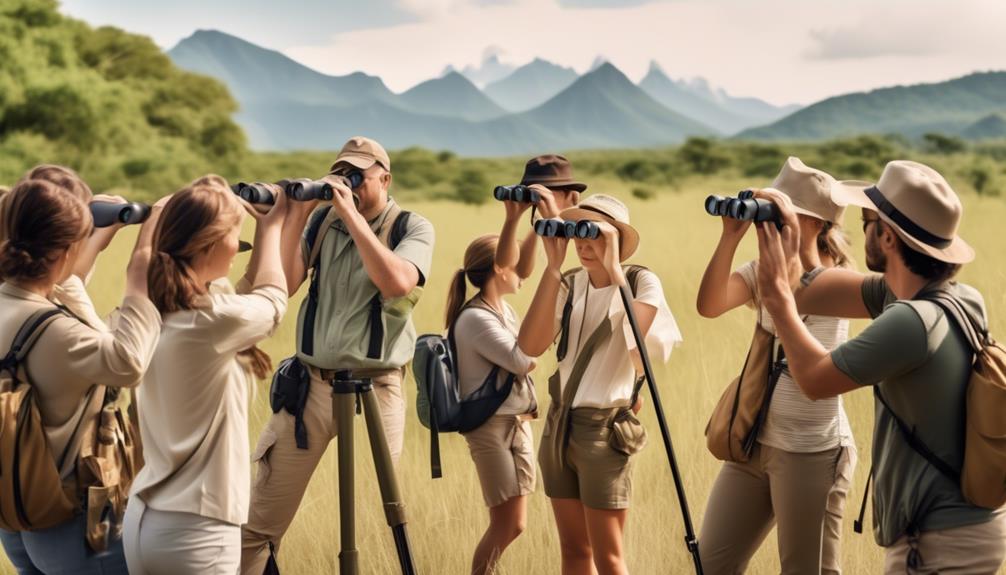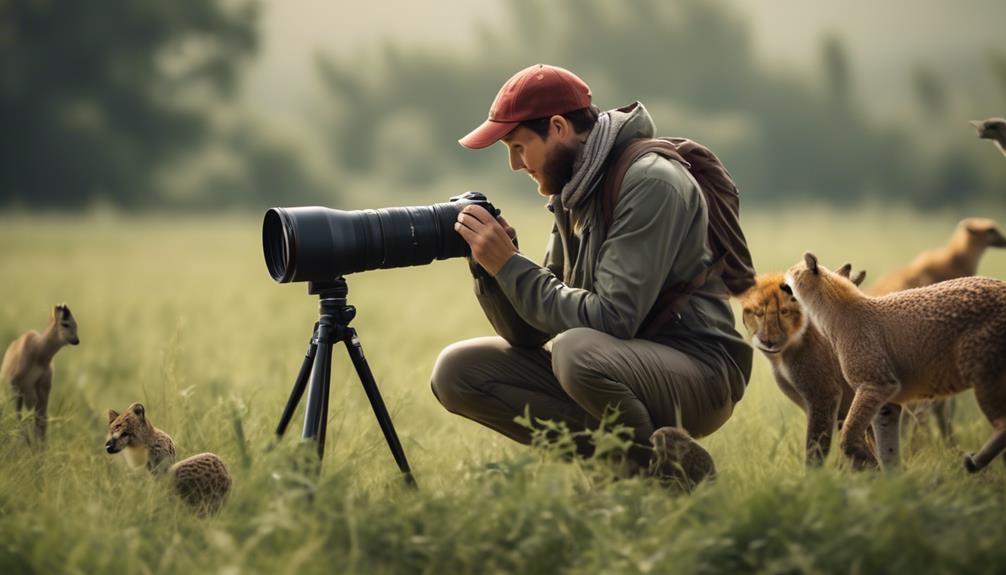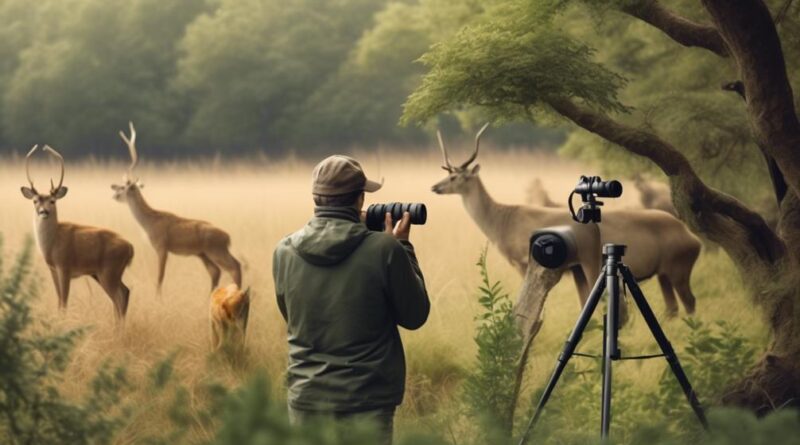12 Tips for Ethical Wildlife Encounters in Adventure Travel
So, you've finally booked that dream adventure travel experience into the heart of a stunning wildlife habitat. But, before you embark on your journey, it's crucial to equip yourself with the knowledge and strategies for ethical wildlife encounters.
These encounters can be impactful and memorable, but they also come with a responsibility to ensure the well-being and conservation of the animals you'll encounter. In this guide, we'll explore 12 key tips that will not only elevate your adventure but also contribute to the preservation of wildlife and their habitats.
Research Wildlife Habitats
To ensure ethical wildlife encounters in adventure travel, it's essential to thoroughly research wildlife habitats to understand the animals' natural behaviors and needs. Start by exploring local ecosystems to gain insight into the diverse range of species that inhabit the area. Understanding the specific needs and behaviors of these animals can help you interact with them in a respectful and non-intrusive manner.
By immersing yourself in the local ecosystems, you can witness wildlife in their natural habitats and observe their interactions with the environment. This firsthand experience will provide valuable knowledge about the animals' behaviors and the factors that influence their well-being. Additionally, it allows you to appreciate the delicate balance of the ecosystem and the importance of conservation efforts to protect it.
Furthermore, consider seeking out conservation volunteer opportunities within the area. Many organizations offer programs that allow travelers to contribute to wildlife conservation efforts while gaining a deeper understanding of local wildlife. Participating in such initiatives not only provides valuable support to conservation projects but also enables you to engage with wildlife in a responsible and sustainable manner.
Ultimately, by researching wildlife habitats and engaging with local ecosystems, you can ensure that your wildlife encounters during adventure travel are conducted ethically. This approach not only fosters a deeper appreciation for the natural world but also promotes the conservation of wildlife and their habitats.
Respect Wildlife Boundaries
Immerse yourself in the local ecosystems to gain a deeper understanding of wildlife habitats and behaviors, which will guide you in respecting wildlife boundaries during your adventure travel. When engaging in wildlife observation, it's crucial to remember that these animals aren't there for our entertainment. They've their own lives, territories, and needs. Respect their space and avoid getting too close, especially during sensitive times such as mating, nesting, or raising young. Being mindful of their boundaries not only ensures their well-being but also enhances the authenticity of your experience.
Ethical photography is an essential aspect of respecting wildlife boundaries. While capturing stunning images of wildlife can be incredibly rewarding, it's imperative to prioritize the welfare of the animals. Use telephoto lenses to maintain a safe distance and avoid disrupting their natural behaviors. Refrain from baiting or luring animals for the perfect shot, as this can lead to habituation and dependency on human food sources, ultimately harming the animals and altering their natural behaviors. Additionally, be mindful of flash photography, particularly around nocturnal animals, as it can disturb their activities and negatively impact their welfare.
Choose Responsible Tour Operators

When choosing tour operators for your adventure travel, prioritize those that demonstrate a commitment to ethical wildlife encounters and conservation efforts. Responsible tourism is crucial for the preservation of wildlife and their natural habitats. Look for tour operators who prioritize wildlife preservation and support sustainable practices. Sustainable operators are those who minimize the negative impact of tourism on the environment and promote animal welfare.
Responsible tour operators should have policies and practices in place that prioritize the well-being of wildlife. They should adhere to guidelines that ensure minimal disruption to the animals and their habitats. This includes maintaining a safe distance from wildlife, using quiet and non-intrusive methods to observe animals, and respecting their natural behaviors. Additionally, responsible tour operators should actively contribute to conservation efforts and support local initiatives aimed at protecting wildlife and their habitats.
Before booking your adventure travel, research tour operators thoroughly. Look for certifications or affiliations with recognized conservation organizations. These affiliations can indicate a tour operator's commitment to ethical wildlife encounters and sustainable practices. Read reviews and seek recommendations from fellow travelers who've prioritized ethical wildlife encounters in their adventures.
Minimize Wildlife Disturbance
As you prioritize choosing responsible tour operators committed to ethical wildlife encounters, it's essential to actively minimize wildlife disturbance during your adventure travel. Wildlife observation is a key component of adventure travel, but it's crucial to remember that wildlife shouldn't be unduly disturbed for the sake of observation. When observing animals, maintain a respectful distance and avoid approaching or following them too closely. This not only minimizes disturbance to the wildlife but also reduces the likelihood of potential conflicts or stress for the animals.
Furthermore, be conscious of your environmental impact when engaging in wildlife observation. Stick to designated trails and viewing areas to avoid trampling on delicate habitats or disrupting nesting grounds. Always follow the principles of 'Leave No Trace,' ensuring that your presence has minimal impact on the natural environment. This includes properly disposing of any waste and refraining from feeding or touching the wildlife.
Consider the use of binoculars or camera lenses with zoom capabilities to observe wildlife from a distance, allowing for a more natural and undisturbed encounter. By minimizing your direct presence and impact, you can promote a more ethical and sustainable approach to wildlife encounters in adventure travel.
Support Conservation Efforts

To actively contribute to ethical wildlife encounters in adventure travel, consider supporting conservation efforts that aim to protect and preserve natural habitats and the species within them. By donating to conservation organizations, you can help fund crucial projects that focus on wildlife protection, habitat restoration, and anti-poaching efforts. Your contributions can make a significant impact on the sustainability of ecosystems and the survival of endangered species.
Additionally, volunteering for conservation initiatives allows you to directly participate in activities such as wildlife monitoring, reforestation projects, and community education, providing valuable hands-on support for conservation efforts. Your time and effort can contribute to the long-term well-being of wildlife and their habitats.
Ways to Support Conservation Efforts:
- Donate to Conservation: Financial support is essential for conservation organizations to continue their vital work. Your donations can fund initiatives such as wildlife conservation research, habitat preservation, and community engagement programs.
- Volunteer for Conservation: Engage in meaningful conservation work by volunteering your time and skills. Whether it's assisting with field research, participating in habitat restoration projects, or educating local communities, your involvement can directly contribute to wildlife conservation efforts.
- Advocate for Conservation: Use your voice to advocate for policies and practices that promote wildlife conservation and habitat protection. By raising awareness and supporting conservation-friendly legislation, you can help create a positive impact on a larger scale.
Avoid Feeding Wild Animals
Have you considered the potential consequences of feeding wild animals during your adventure travel experiences? It may seem harmless to offer food to a curious monkey or a friendly deer, but this seemingly innocent act can have detrimental effects on both the animals and the natural environment.
When engaging in wildlife photography, ethical practices should always be a top priority, and this includes avoiding feeding wild animals.
Feeding wild animals disrupts their natural foraging behaviors and can lead to dependency on human food sources. This dependence not only alters their natural diet but also exposes them to potential health risks from consuming inappropriate foods.
Additionally, animals that become accustomed to being fed by humans may lose their fear of people, increasing the likelihood of conflicts and aggression.
Capture Moments Ethically

When capturing wildlife moments, always prioritize respectful and ethical practices to ensure minimal disturbance. Respectful photography is essential to minimize stress on the animals and preserve their natural behavior. Here are some tips to help you capture moments ethically while observing wildlife behavior:
- Maintain a Safe Distance: Always keep a safe distance from the wildlife to avoid causing them stress or altering their natural behavior. Use zoom lenses to get closer shots without intruding on their space.
- Be Patient: Instead of trying to get the perfect shot quickly, take your time and observe the wildlife from a distance. This allows you to capture authentic moments without disrupting their activities.
- Avoid Disturbing Habitats: When positioning yourself for a photo, be mindful of the environment. Take care not to trample vegetation or disturb nests, dens, or other habitats.
Educate Yourself and Others
As you continue your wildlife photography journey, it's crucial to educate yourself and others about the impact of your actions on the animals and their habitats. Understanding wildlife behavior is essential for ethical encounters. By learning about the species you wish to photograph, you can anticipate their movements and reactions, reducing the likelihood of causing them stress or altering their natural behavior.
Additionally, educating yourself on environmental impact is vital. Familiarize yourself with the ecosystems you'll be visiting, as well as any regulations or guidelines in place to protect them. This knowledge will help you minimize your footprint and ensure that your presence doesn't disrupt the delicate balance of the environment.
When it comes to educating others, lead by example. Share your knowledge and experiences with fellow travelers and photographers. Encourage them to prioritize the well-being of the wildlife and their habitats. By spreading awareness, you can help create a community of responsible wildlife enthusiasts who are committed to ethical practices.
Furthermore, take advantage of social media and other platforms to raise awareness about ethical wildlife encounters. Share information about best practices, wildlife conservation, and the importance of respecting animals in their natural environment. By leveraging your online presence, you can reach a wider audience and inspire others to approach wildlife encounters with mindfulness and responsibility.
Frequently Asked Questions
What Should I Do if I Encounter a Wild Animal While Hiking or Camping?
If you encounter a wild animal while hiking or camping, prioritize wildlife safety by keeping a safe distance, avoiding sudden movements, and not feeding or approaching the animal. Practice ethical behavior by observing from a respectful distance.
How Can I Tell if a Tour Operator Is Truly Responsible and Ethical in Their Wildlife Encounters?
To ensure responsible operators for wildlife interaction, look for those providing conservation education and promoting ethical photography. Check if they support local conservation efforts and prioritize animal welfare in their tours.
Are There Any Specific Photography or Videography Guidelines for Capturing Wildlife Ethically?
When capturing wildlife behavior, prioritize ethical photography and videography. Respect the environment and minimize your impact. Utilize zoom lenses to maintain a safe distance, avoid disturbing the animals, and never manipulate their natural behavior for a photo.
What Are Some Common Mistakes That People Make When Trying to Support Conservation Efforts?
Common misconceptions about conservation efforts include assuming that all wildlife sanctuaries are ethical, and that buying wildlife products supports conservation. In reality, some sanctuaries exploit animals, and purchasing wildlife products fuels illegal trade.
How Can I Educate Others About the Importance of Ethical Wildlife Encounters in Adventure Travel?
To educate others about ethical wildlife encounters in adventure travel, start by raising public awareness. Use advocacy and outreach to promote responsible interactions with wildlife. Educate others about the importance of ethical wildlife encounters to ensure conservation efforts are supported.
Conclusion
Next time you embark on an adventure travel, remember these 12 tips for ethical wildlife encounters.
By respecting wildlife boundaries, supporting conservation efforts, and choosing responsible tour operators, you can minimize wildlife disturbance and contribute to the preservation of natural habitats.
Educate yourself and others on the importance of ethical wildlife encounters, and together, we can ensure that future generations can continue to enjoy the beauty and wonder of the world's wildlife.
